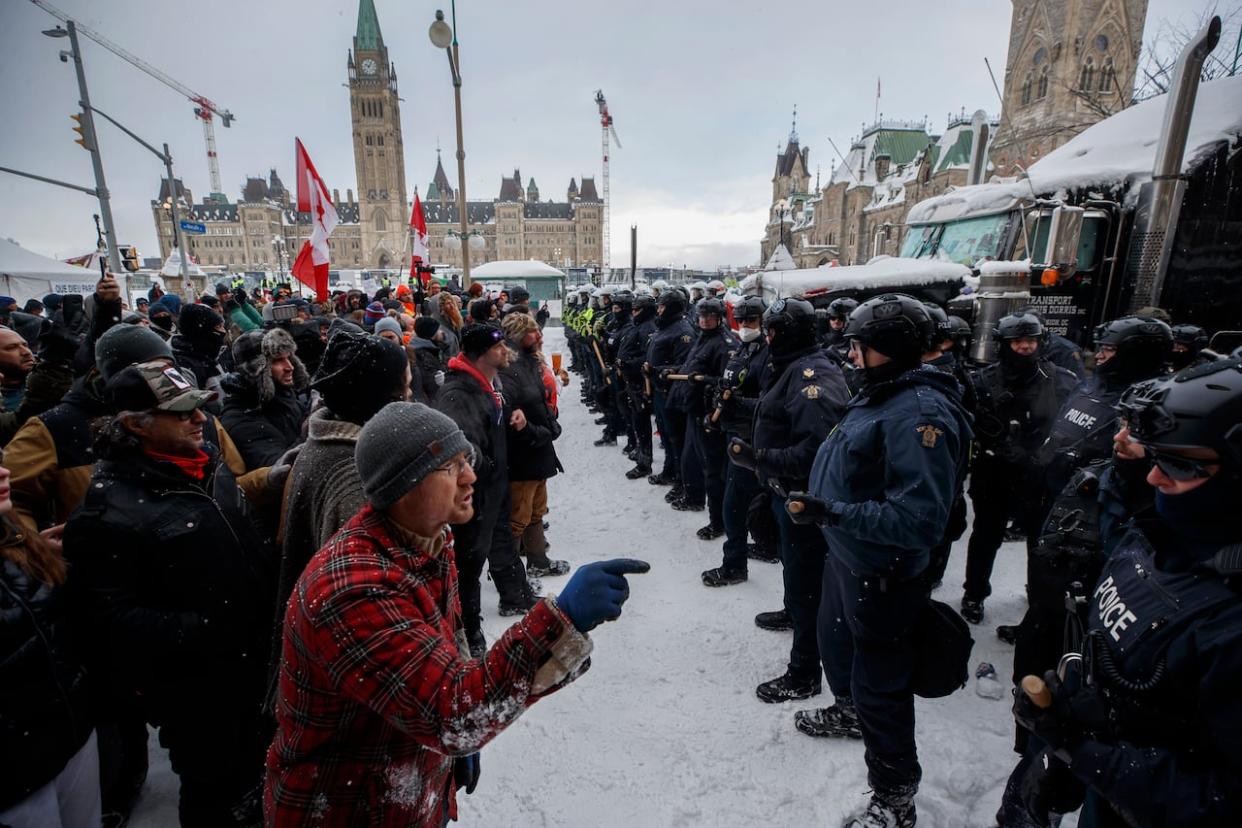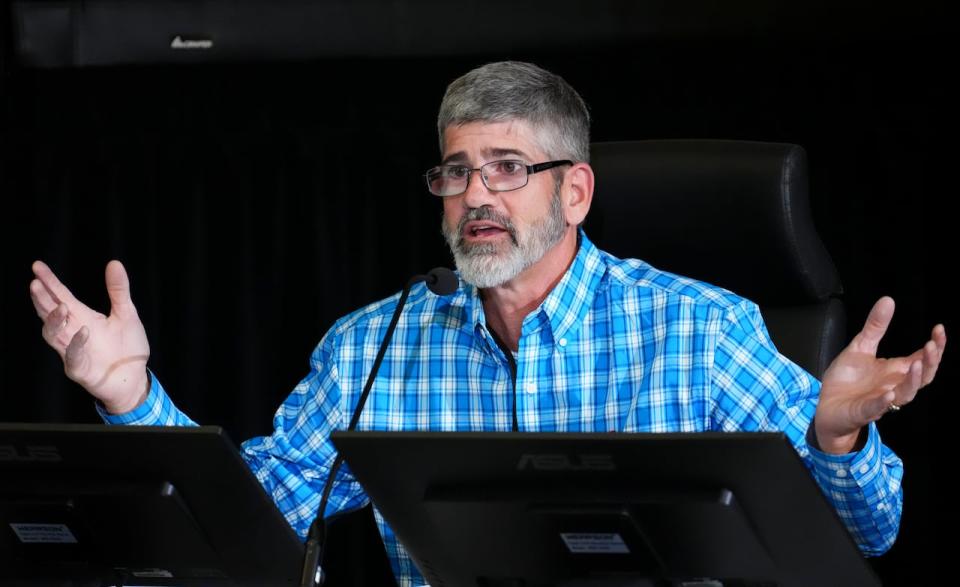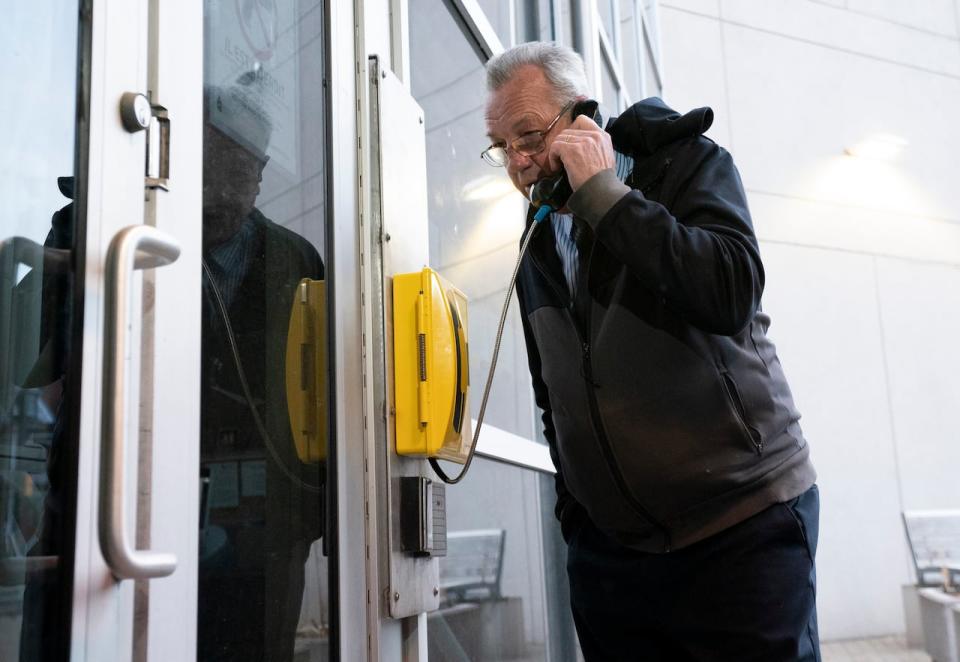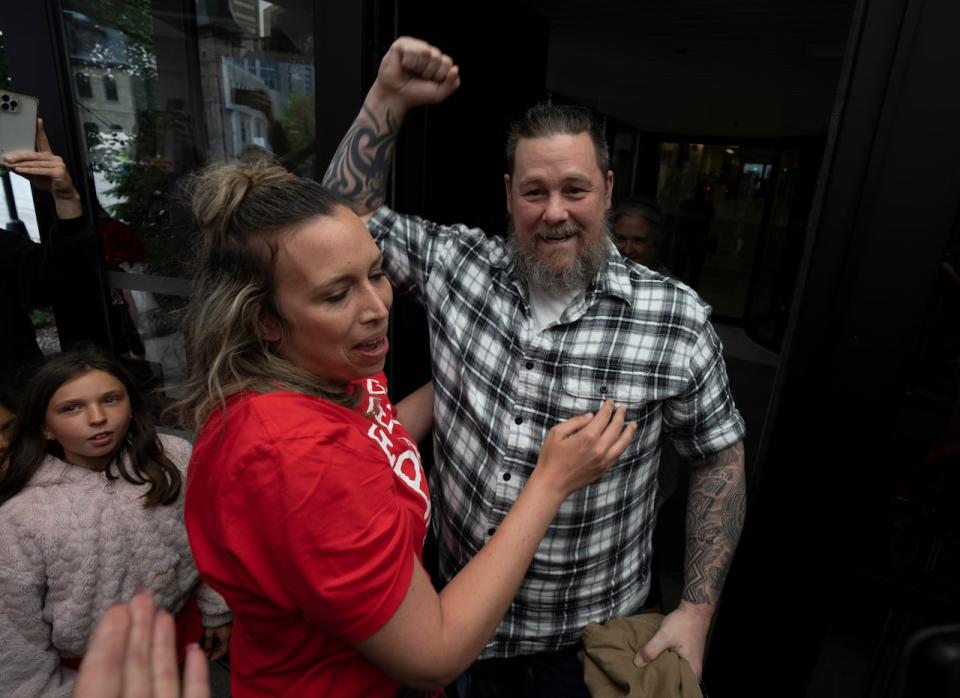Changing trial venue an ill-fated strategy for convoy organizers

After failing in their attempts to have their criminal trials moved elsewhere, leaders of what became the Freedom Convoy in Ottawa will be tried in the city where they came to protest for more than three weeks in early 2022.
Lawyers say attempts to change the court venue were ill-fated from the start.
"It's a pretty high standard that you have to meet to demonstrate bias," said Vancouver-based lawyer Kyla Lee, chair of the Canadian Bar Association's criminal division.
"Having been annoyed by the actions of the Freedom Convoy is probably not going to rise to the level of demonstrating bias in a juror."
There is no right to be tried by persons who share one's political views. - Justice James Hackland
Three men will be tried by jury in Ottawa for their roles in the truck-based protest that rolled into Canada's capital in January 2022, calling for an end to COVID-19 mandates among other grievances.
Dirk Derstine, a criminal defence lawyer at Derstine Penman in Toronto, said defendants often apply to change venue when they're apprehensive local jurors might be "riled up against the accused for whatever reason."
In some cases, Crown lawyers argue that no matter where a trial moves, that same apprehension of bias could exist.
"There's no point running away from it, because everybody's going to know this," he said.
King, Bauder, Hillier denied venue change
James Bauder, a 52-year-old from Calgary, unsuccessfully argued in February he was the victim of "political persecution."
The self-represented convoy organizer led a smaller truck protest to Ottawa in 2021 and returned the following year alongside thousands of others.
On both trips he was promoting a now-infamous "memorandum of understanding" demanding that COVID-19 measures be overthrown and Prime Minister Justin Trudeau step down for "committing treason and crimes against humanity."
Now facing charges of mischief to obstruct property, disobeying a lawful court order and obstructing a peace officer, Bauder tried to get his case moved to Brockville or North Bay, Ont.

James Bauder appears as a witness at the Public Order Emergency Commission in Ottawa on Nov. 3, 2022. (Sean Kilpatrick/The Canadian Press)
"I believe that I will not get a fair trial in Ottawa because I participated in a very high-profile, highly politicized, lawful protest directed at the federal government in Ottawa," he said during a Feb. 3 hearing, adding the city is full of government employees who are "not my peers."
His bid was rejected after a Superior Court justice determined Bauder wasn't well-known enough.
In a written decision Justice Charles Hackland said Bauder's argument was "baseless in fact and boils down to his concern that most Ottawa residents do not share his political views."
"There is no right to be tried by persons who share one's political views," Hackland ruled.
Randy Hillier, who was an Ontario MPP during the protests in Ottawa, was also denied a change of venue.
His lawyer David Anber argued there was "widespread bias" against protesters that could prejudice potential jurors.
Hillier was arrested in March, after the convoy had left Ottawa, but there were calls for him to be taken into custody during the protests after he encouraged supporters to call emergency phone lines. He was also involved in a scuffle with police on Parliament Hill.

Former MPP Randy Hillier arrives to turn himself in at Ottawa police headquarters on March 28, 2022. Police announced nine charges against him soon after. (Adrian Wyld/The Canadian Press)
In her decision, Ontario Superior Court Justice Anne London-Weinstein agreed there was a probability of prejudice against Hillier, but she said there were enough safeguards to prevent a jury from being biased, including by screening prospective jurors.
"Unfortunately she was not persuaded that the normal safeguards wouldn't grant Mr. Hillier a fair trial," Anber said in a statement. "We disagree with the outcome but are accepting it at this time and moving on with preparing to contest the trial."
Hillier, who represented an Ottawa-area riding between 2007 and 2022, is charged with assaulting a police officer, mischief and seven other charges.
Pat King's lawyer Natasha Calvinho argued her client is more notorious than Bauder or Hillier. King's social media feed was a must-watch for many taking part in or watching the protests.
He's facing charges of mischief, counselling others to commit mischief, disobeying a court order and obstructing police for his role in the weeks-long protest.
Calvinho had argued her client was too "notorious" and that King "was and still is more highly publicized than most other people involved in the Freedom Convoy."
But Hackland said the law "will provide the needed safeguards against potential juror bias."

Pat King pumps his fist as he emerges from the Ottawa Courthouse after receiving bail on July 18, 2022. (Adrian Wyld/The Canadian Press)
Courts safeguard against bias
Derstine said biased jurors can be screened out through specific questions during jury selection.
"There's a fair amount of judicial resistance to the idea of change of venue applications," he said. "They happen, but it's a pretty high bar."
Beyond a general desire to have crimes tried in the jurisdiction in which they were committed, Derstine said there's also a "balance of convenience" argument against moving trials.
Moving a trial adds travel and other costs for the people involved, and creates a burden for whatever jurisdiction it's moved to.
"Other jurisdictions don't just rub their hands with glee at the idea of taking your big high-profile trial," Derstine said.
Lee said when a juror is selected, it's presumed they'll be able to fulfil their obligations in an impartial manner.
"It's pretty hard to say that there is bias just because they heard some honking or traffic affected them really badly. It has to be something more closely related, like a painting of the mind of the jury against the individual, or actions undertaken by that jury that demonstrates bias against the accused," she said.
Neither Tamara Lich nor Chris Barber, two of the protests's other main organizers, attempted to move their trials.
They're being jointly tried by a judge alone on charges for mischief, counselling others to commit mischief, intimidation and obstructing police.
That trial is set to resume later this month.


